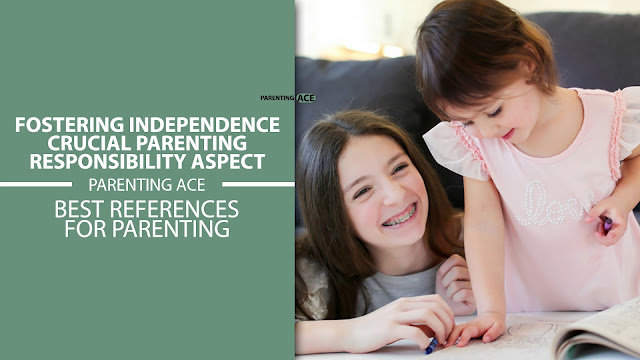Fostering Independence: A Crucial Aspect of Parenting Responsibilities
In the journey of parenting, fostering independence emerges as a cornerstone, vital for sculpting resilient, self-assured individuals poised for success in the complexities of adulthood. As parents, we bear the profound responsibility of guiding our children toward self-sufficiency, striking a delicate balance between support and autonomy. In this blog post, we delve into the pivotal role of nurturing independence in children, exploring effective strategies and insights to empower them on their path to autonomy and self-discovery. Join us as we unravel the intricacies of this essential aspect of parenting and unlock the potential for our children's future success and fulfillment.
 |
| Fostering Independence: Crucial Parenting Responsibility Aspect |
Parenting is a multifaceted journey filled with numerous responsibilities, one of the most significant being fostering independence in children. As children grow, the ability to navigate the world independently becomes increasingly vital. In this article, we delve into the importance of fostering independence as a core aspect of parenting responsibilities and explore effective strategies to nurture this quality in children.
The Significance of Fostering Independence
Fostering independence in children is essential for their overall development and future success. Independent individuals possess critical life skills such as decision-making, problem-solving, and self-reliance, which are crucial for thriving in adulthood. Moreover, independence nurtures resilience and adaptability, enabling children to face challenges with confidence and perseverance. By instilling independence, parents empower their children to explore their potential, pursue their passions, and contribute meaningfully to society.
Understanding the Parenting Role
Central to fostering independence is understanding the role of parents in guiding and supporting their children's journey towards self-sufficiency. Parents serve as facilitators, providing the necessary tools, guidance, and encouragement for children to develop independence gradually. This involves striking a balance between offering support and allowing children the freedom to make their own choices and learn from their experiences. It also requires patience and understanding as children navigate obstacles and setbacks on their path to independence.
Effective Strategies for Fostering Independence
- Encourage Decision-Making: Involve children in decision-making processes from an early age, allowing them to voice their opinions and make choices within age-appropriate boundaries. Encourage critical thinking by discussing the consequences of different decisions and empowering children to weigh their options.
- Foster Responsibility: Assign age-appropriate chores and responsibilities to children, such as tidying up their rooms, completing homework independently, or helping with household tasks. This instills a sense of accountability and teaches children the value of contributing to the family unit.
- Support Risk-Taking: Encourage children to take calculated risks and step out of their comfort zones to explore new opportunities and interests. Provide a safe and supportive environment where children feel empowered to try new things, learn from failure, and develop resilience.
- Cultivate Problem-Solving Skills: Offer guidance and support as children encounter challenges, but resist the urge to solve problems for them. Instead, encourage children to brainstorm solutions, analyze alternatives, and learn from their mistakes. This fosters independence and equips children with valuable problem-solving skills for the future.
- Promote Self-Advocacy: Teach children to communicate their needs, preferences, and concerns effectively. Encourage them to speak up for themselves, ask for help when needed, and advocate for their interests in various settings, such as school, extracurricular activities, and social interactions.
Fostering independence is a fundamental aspect of parenting responsibilities, laying the groundwork for children to become confident, capable, and self-reliant individuals. By embracing their role as guides and supporters, parents can empower their children to embrace challenges, pursue their goals, and navigate the complexities of adulthood with resilience and confidence. Through effective strategies and nurturing environments, parents play a vital role in shaping the independent spirits of the next generation.




